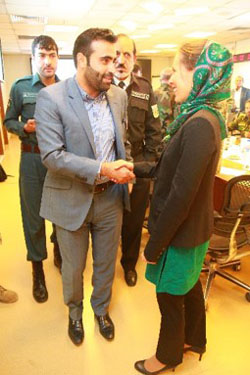Advancing governance goals in Afghanistan’s defence and security sector
In October and November, NATO-sponsored seminars supported Afghan civil and military officials with the review of national security policy documents and inter-ministerial processes central to the execution of current defence and security objectives. Moreover, a course involving table-top exercises provided opportunities to learn more about strategic planning and improve civil-military interaction.

Junior Officer Strategic Planning course participants
These events were organised under the auspices of the Defence Education Enhancement Programme (DEEP) run by NATO’s Political Affairs and Security Policy Division, within the wider context of NATO’s Enduring Partnership with Afghanistan. They paved the way for further cooperation in the field of defence education.
Participants included representatives of the Afghan National Security Forces General Staff, the National Directorate of Security, and the ministries of defence, interior and foreign affairs.

Deputy Minister of Interior Masood Ahmad shakes hands with DEEP Programme Manager Amanda Sellers.
“It’s not just about what to learn but how to learn – how to think critically, how to come up with dynamic solutions, how to work as a team, how to communicate, how to interact with and influence others, how to network and manage data in an interdisciplinary fashion,” says Maj Gen Gordon Davis of NATO’s Resolute Support Mission in Afghanistan. He attended the annual review of the DEEP programme in Kabul in October.
“Building a strategic vision is not possible without a strategic culture,” commented Afghan Deputy Minister of Interior Masood Azizi at the same meeting.
The Senior Leaders' Executive Seminar at NATO Headquarters and SHAPE in Belgium provided a forum for dialogue on strategic planning and policy development. The Afghanistan Seminar on Interagency Coordination took place at NATO’s Joint Force Command Brunssum in the Netherlands.
Complementing this dialogue, a strategic planning course for junior officers took place in Kabul. Table-top exercises, guided by specific topics proposed by the Afghan authorities, served to outline strategic approaches to specific political, civil-military, interagency and multinational challenges that the national unity government currently faces.
This event was facilitated jointly by an academic team of professors from the Marshal Fahim National Defense University, the U.S. Army War College, the Romanian National Defence University, the Armed Forces Academy of Slovakia, U.S. European Command, and NATO staff officers.
“I am grappling with interagency challenges on a day-to-day basis. DEEP is foundational to our work in this regard,” says Col Ghulam Jilani Sayad of the Marshal Fahim National Defense University.